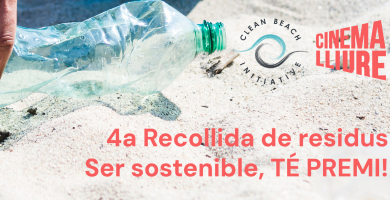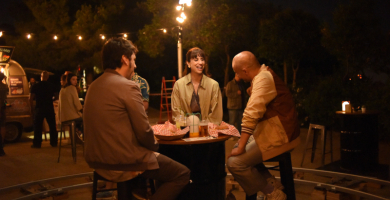
Peter Welter Soler: "The Spanish system of tax rebates is very complex and generates insecurities"
We interview Peter Welter Soler. Born in 1970, he began studying dramatic art and Anglo-Saxon literature.

Soon he found that his work would be "behind the cameras" and in 1993 he began to work in the film industry. In 2000 he worked as an assistant producer and director for the production company that became later Fresco Film, and in 2006, Peter joined this company as a shareholder. He has worked as production director and executive producer in international projects for television, as well as in commercial productions. He has worked for productions such as Game of Thrones for HBO and Emerald City for NBC Universal. We talk to him about the tax rebate, an essential of any international production.
- What is a tax rebate?
First of all, it is necessary to differentiate the concept of "tax rebate" from the concept "subsidy". A tax rebate is not a subsidy (financial aid to lost funds), but a stimulus for investment in audiovisual production that implies a previous expense, in order to make a movie. Tax rebates are very positive. For each euro invested, 15 cents are returned, it represents between 5 and 6 euros of return for the Spanish tax. It stimulates the creation of wealth and influences the creation of jobs. In this way the final beneficiary is the taxpayer. To understand how it works, we can make a simple parallelism with the way in which supermarkets make offers to its customers, that is, I get a small discount if I buy two units.
- What are the advantages of a tax rebate?
It is an essential tool in order to film in our country. The audiovisual sector sells the "Marca España" to attract foreign productions, without them (incentives, the rebates) it would be almost impossible to sell the destination. Today, the first thing that producers study is precisely the fiscal incentive of a country, it has become almost a sine qua non fact.
- The tax rebate is enjoyed by the Spanish company, but it is the foreign productions that benefits the profit. Can you explain a bit how does it work?
Indeed, the tax incentive is computed in Spain through the corporation tax. It seems good to us, since it forces the international production to hire a Spanish company. A foreign company can not come to tax in another country. Of course the taxes remain in the territory. According to our billing and expenses, we will be refunded a maximum of 15%* in tax. The final destination of this "saved" amount is to the customer (that is, foreign production). We can continue comparing it with the example of the supermarket, we would say that, afterwards, we make a 15% discount to the international company.
*At the date of publication of this interview, it is said that an increase in the percentage would apply soon.
- Everything seems advantageous, but is there any disadvantage in applying the tax rebate?
At this time, the service producers (in our case, Fresco Film*) work with a tremendous legal insecurity. On the one hand, our country uses us as a necessary tool to attract foreign productions to Spain (which benefits us all), but on the other hand, the form of justification of the attributable and deductible expenses generates a tremendous insecurity. When we make the corporate tax declaration-liquidation, the producer attributes some deductible expenses and with these data, we negotiate with the foreign client.
The files are subject to review by the Treasury within four years. The service producer thus becomes a kind of "shock absorber". In such a period of time, an inspection may be found indicating that some expenses are not deductible. This situation may entail the return of an amount of money, which must be added to the late interest and the subsequent fine. At this time the foreign customer is gone with the relevant discount and we not be able to claim it. This situation obliges Spanish producers to respond even with their personal assets.
*We clarify that we are talking about the producers that provide a service to foreign productions, that are governed by article 36.2 of the Spanish Law on the Tax of Companies.
- Are there institutional agents that support you? Does they try to change this situation?
Well, let's just say that the sector is mobilizing. In fact, the 6 or 7 major service producers in Spain are creating a specific association to address these issues that we are so concerned about. We understand that for our clients we have to "sell" seriousness, professionalism and legal stability.
- Can you compare the Spanish situation with another European country?
Let's put the example of Portugal. The system in Portugal is simple and effective. When a production is finished, the local producer requests an external audit that is sent to the ICA (Instituto do Cinema e do Audiovisual). Within a maximum period of 20 days, the ICA resolves the file and refers it to the Portuguese property. With the approval of the ICA the file is closed without the possibility of subsequent revisions. On the other hand, here in Spain we are at the mercy of a possible inspection of the Treasury, being carried out (as I have said before) until a period of four years. We work in a remarkable legal insecurity. We tried to request an early voluntary inspection, so we could know what to stick to, but the response was negative by the authorities.
- When you compare the Spanish case with the rest of Europe, would you say that we are the country with the most complex legislation?
Of course and by far. The Spanish system is the one that generates more insecurity and is the most complex. The final report may be random and depends on the agent you are assigned. However, and despite the foregoing, we want to say that we have been able to speak with an inspector who is willing to listen us and once our file had been verified to what is established by law, she has made a favorable report. But we do know cases of colleagues in other latitudes that are having problems. The most important thing for us is making sure that the system works. We want an established, protocolized, agile and secure system. In short, to avoid randomities.
- Since when does this tax rebate apply in Spain?
It entered into force on January 1st, 2015 and from that date on, the sector has been organized to exchange information and experience. We want to give mutual advice in order to organize and communicate our concerns to those responsible for the public sector.
- It is said that the incentive will go soon from 15% to 20%...
Due to the need of an agreement on the general State budgets, there have been initiatives by a political party to improve the offer of incentives. We appreciate the attempt, but in fact they have been left it in the middle. An increase in the percentage has been achieved but the other demands of the sector have not been achieved. It was requested that the minimum of €1,000,000 were reduced to €200,000. As a minimum, it is so high that many productions automatically discard our country. In Spain the audiovisual market could benefit from these incentives if the minimum were reduced (the case of telefilms, for example).
On the contrary, it was requested to increase the maximum of the incentives that now stands at between €2,500,000 and €3,000,000, because in this case we also exclude big Hollywood productions. Investing in Spain a large amount of money is not worth for them if the maximum reimbursement is not much higher. An American film of €100,000,000 will never land in Spain when it has a limit of €3,000,000 and it will obviously go to other countries where this limit is €20,000,000, for example.
- When these issues are discussed, do our legislators consult experts and professionals in order to legislate in a proper way?
I believe in the goodwill of the legislators, but I also know that professional producers are not consulted, and finally, they will be the ones who will have to work on the subject. Following Portugal's example, when you are going to inform yourself about the tax incentives, they give you a dossier of about 30 pages containing all the relevant information on the subject. In Spain, when you consult the information available, there is just one paragraph enrolled in the corresponding law. It is not really helpful.
- Do you think it would be interesting to bring the sector together and see how it could be ordered from public institutions?
The only thing that I think can benefit us all, in truth, is the dialogue and the exchange of opinions. Face to face people, understanding them and proposing solutions to possible adversities is the best way. I will put as an example the experience we had in Girona shooting a part of the sixth season of Game of Thrones. We always had a weekly meeting with all the agents involved: City Hall, neighborhood associations, merchant associations... and the result was magnificent and very rewarding.
- Finally we want to ask you about the shootings in the city of Barcelona. Is it difficult to come to Barcelona to film a production, such as Emerald City or Der Barcelona Krimi?
The experience is totally positive. Professionals are aware of the difficulties of a city that hosts many shoots (not only fiction but also advertising) and that should combine the use of public space with other activities, as well as the usual functioning of a city full of outdoor activities and "congested" by tourists (at least in some areas). It would be good to be able to speak with the institutions and seek a solution without causing difficulties to the citizens.









